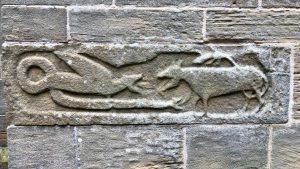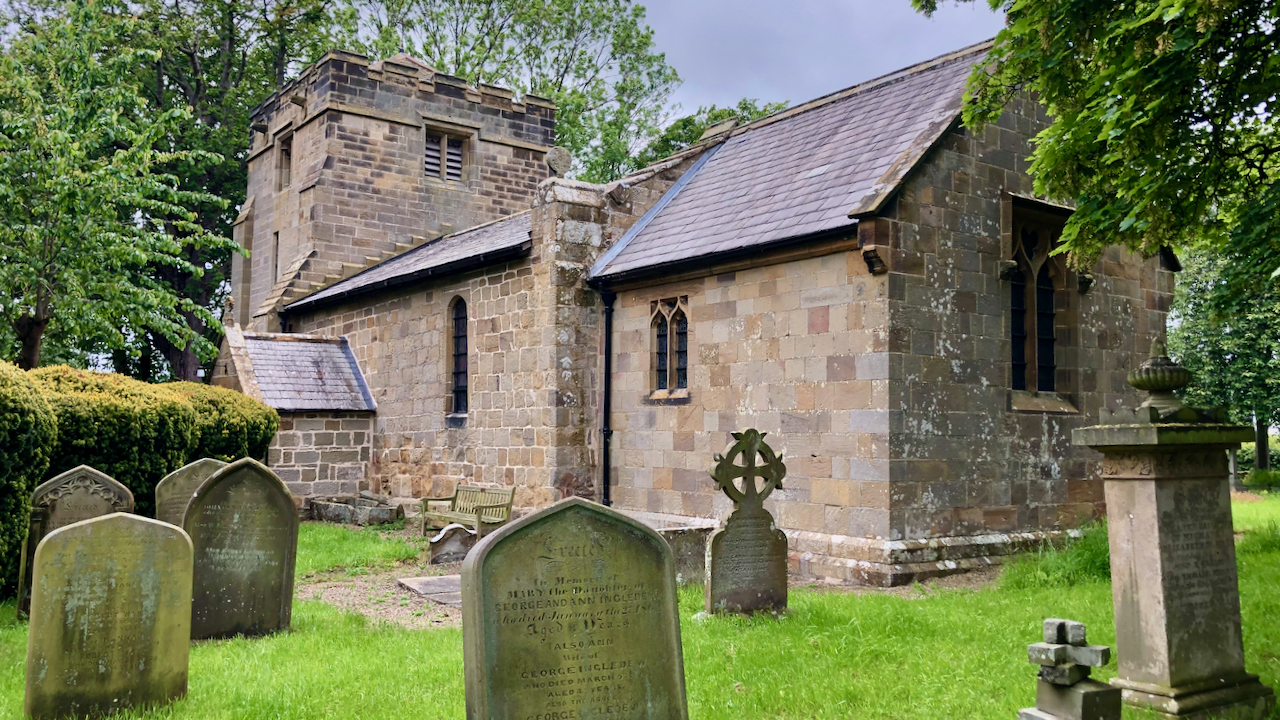
St. Oswald’s Church, Newton-under-Roseberry, doesn’t radiate that sense of antiquity you get with some churches. Although some stonework of the the nave and chancel are evidently Norman, the present chancel dates from 1857 and the tower from 19011Historicengland.org.uk. (2012). CHURCH OF ST OSWALD, Guisborough – 1139807 | Historic England. [online] Available at: https://historicengland.org.uk/listing/the-list/list-entry/1139807?section=official-list-entry [Accessed 6 Jun. 2022]..
A curious block of carved stonework built into the buttress of the tower suggests an early church once existed2Pevsner, Nikolaus. “The Buildings of England – Yorkshire – The North Riding”. Penguin Books. Reprinted 1985. ISBN 0 14 071009 9.. More carving on the end points to it being originally an impost block3The top course of a pillar that supports an arch..
I came across this report in the Skegness Standard for 10 November 1926, of a disgraced vicar who once briefly held the curacy of St. Oswald’s from 1914 to 19174Britishnewspaperarchive.co.uk. (2022). VICAR SENTENCED. | Skegness Standard | Wednesday 10 November 1926 | British Newspaper Archive. [online] Available at: https://www.britishnewspaperarchive.co.uk/viewer/bl/0001935/19261110/048/0003 [Accessed 25 Mar. 2022]..
VICAR SENTENCED.
Eight Charges off Gross Indecency.
Alfred Reginald Thorold Winckley (60), Vicar of Cadney-cum-Howeham, near Brigg, pleaded guilty to eight charges of committing acts of gross indecency with four male persons, at Cudney, on various dates in January and October, 1925, and January, February, May, and June, 1926.
To three charges indecent assault he pleaded not guilty. Mr. C. E. Dyer, K.C., with Mr. A. M. Lyons, appeared for the accused, instructed by Messrs. Nelson and Jackson, Lincoln.
Before the case was taken the Judge advised women in Court that the case was of a very unpleasant nature, and said that while they were not obliged lo leave, they would be sorry they did not. All left, including the Mayor of Lincoln (Miss Nevilo), who was on the Bench.
Mr. Carter, for the Crown, said he did not propose to offer any evidence on the charges to which prisoner had pleaded guilty.
Mr. Dyer said the case had given him the greatest anxiety, but after careful consideration of all the circumstances he was unable to advise the accused to take any other course than that which had done. It also avoided giving nauseous details in Court and putting young fellows to the shame and disgrace of giving evidence. How a man of normal condition could enter on such a course was in comprehensible, and he felt that so strongly that had had his client examined an expert, and his report might offer some explanation of otherwise unintelligible conduct. He was really hardly normal. He took his B.A. degree in 1883[?] at Cambridge, and was ordained deacon in 1889[?] and priest in 1890, and for some years served satisfactorily in various curacies. From 1900 to 1911 he held appointments abroad, and in the latter year became curate of Sculcoates, Hull. In 1914 he became vicar of Newton-in-Cleveland, and in 1917 Vicar of Baumber with Great Sturton, Lincolnshire. In 1920 he went to Cadney, and his career then had been quite creditable. The very fact of his being there, in dock, was to such a man a terrible punishment. His brother, Canon Winckley, of Houghton Rectory, Leicester, was in Court, and if his lordship could see his way to take a certain course was ready to take the responsibility for accused’s future and ensure that he was secluded in some suitable establishment where the rigidity of discipline would lead him to see the error of his ways.
In reply to the Judge, Mr. Dyer said accused was 60, and had never married. Since being on bail had been in institution.
Canon S. T. Winckley said his brother had been in an institution since August 3rd. He was satisfied that it was a fit and proper place for him, and he was willing to be responsible for him going back there.
The Judge said he would spare the accused’s feelings by saying as little possible, and he asked prisoner believe that it was very painful duty for him, as a University man to sentence another University man. He could not, however, accede to the request made to him by counsel and send prisoner to a Home. He must pay the penalty the laws provided, but the same time, said the Judge, recognised that the case was mental one, and the time might come when such cases would be treated medically, or surgically. He was sorry to any that he must sequester him in prison in the second division, where there would be an opportunity of seeing to his state of mind, and he hoped that when prisoner came out he would be fit for a Home. The sentence would be six months in the second division on each charge, to run concurrently.
- 1Historicengland.org.uk. (2012). CHURCH OF ST OSWALD, Guisborough – 1139807 | Historic England. [online] Available at: https://historicengland.org.uk/listing/the-list/list-entry/1139807?section=official-list-entry [Accessed 6 Jun. 2022].
- 2Pevsner, Nikolaus. “The Buildings of England – Yorkshire – The North Riding”. Penguin Books. Reprinted 1985. ISBN 0 14 071009 9.
- 3The top course of a pillar that supports an arch.
- 4Britishnewspaperarchive.co.uk. (2022). VICAR SENTENCED. | Skegness Standard | Wednesday 10 November 1926 | British Newspaper Archive. [online] Available at: https://www.britishnewspaperarchive.co.uk/viewer/bl/0001935/19261110/048/0003 [Accessed 25 Mar. 2022].

Leave a Reply